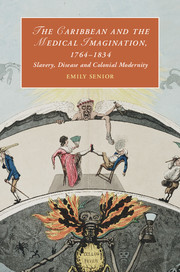Book contents
- The Caribbean and the Medical Imagination, 1764–1834
- Cambridge Studies in Romanticism
- The Caribbean and the Medical Imagination, 1764–1834
- Copyright page
- Dedication
- Epigraph
- Contents
- Illustrations
- Acknowledgements
- Communicating Disease
- Part I Health, Geography and Aesthetics
- Part II Colonial Bodies
- Chapter 3 Skin, Textuality and Colonial Feeling
- Chapter 4 ‘A Seasoned Creole’ and ‘a Citizen of the World’
- Part III Revolution and Abolition
- Afterword
- Notes
- Bibliography
- Index
- Cambridge Studies in Romanticism
Chapter 3 - Skin, Textuality and Colonial Feeling
from Part II - Colonial Bodies
Published online by Cambridge University Press: 20 April 2018
- The Caribbean and the Medical Imagination, 1764–1834
- Cambridge Studies in Romanticism
- The Caribbean and the Medical Imagination, 1764–1834
- Copyright page
- Dedication
- Epigraph
- Contents
- Illustrations
- Acknowledgements
- Communicating Disease
- Part I Health, Geography and Aesthetics
- Part II Colonial Bodies
- Chapter 3 Skin, Textuality and Colonial Feeling
- Chapter 4 ‘A Seasoned Creole’ and ‘a Citizen of the World’
- Part III Revolution and Abolition
- Afterword
- Notes
- Bibliography
- Index
- Cambridge Studies in Romanticism
Summary
- Type
- Chapter
- Information
- The Caribbean and the Medical Imagination, 1764–1834Slavery, Disease and Colonial Modernity, pp. 89 - 121Publisher: Cambridge University PressPrint publication year: 2018



